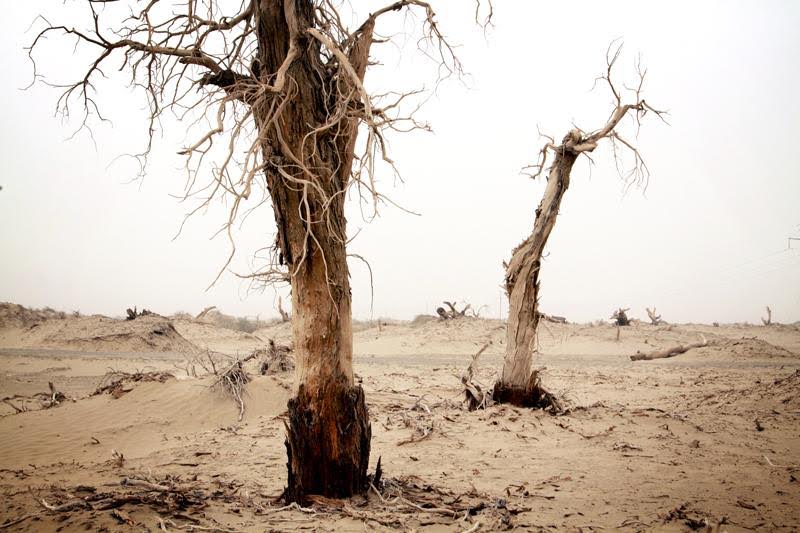Without land, there is no life

August 1, 2016
By Greg Fay and Henryk Szadziewski
UHRP’s new report on environmental activism among Uyghurs demonstrates the lack of a Uyghur voice in addressing harmful state policies
For a number of years the political, economic and social condition of the Uyghurs was often labeled as an “underreported” issue and measured against the well-known human rights concerns of Tibetans. However, since 9/11 this relative anonymity in the global discourse has changed with politicians, journalists and security experts pondering direction of Uyghur political resistance. This new interest while garnering much attention frequently ignores the decreasing space allowed for peaceful opposition to Chinese state policies.
The Uyghur Human Rights Project’s (UHRP) new report Without land, there is no life documents the suppression of Uyghur environmental activism in the context of increased migration and center-led economic campaigns in East Turkestan. The report reveals how the Chinese government does not separate legitimate expressions of concern over the environment among Uyghurs from threats to the Chinese state. One interviewee remarked to UHRP, for Uyghurs to exercise the right of association and assembly over an environmental concern was “impossible, unimaginable…It’s not even allowed for three Uyghurs to gather without raising suspicion.”
In such a statement the mechanisms of Chinese state suppression are laid bare. China uses heightened security to limit Uyghur civil society and quell peaceful opposition to its policies. The absence of a Uyghur voice in environmental decision-making is matched elsewhere. In the areas of education, economic planning, religious governance and cultural identity the genuine and meaningful participation of Uyghur civil society does not meet internationally recognized standards. The import of experts unfamiliar with the region to facilitate rapid economic growth ignores the vital contribution of indigenous Uyghur knowledge to sustainable development–a key finding of UHRP’s new research.
Economic development is often cited by the Chinese government as the key to resolving ethnic tensions in the region. Officials often remark on how cities in eastern China should be studied as a model for opening economic opportunities in East Turkestan. In addition, the early template of poor enforcement of environmental regulation in the east has also been transferred to the west. Reports indicate that while the state tightens up adherence over industrial emissions on coastal China, high polluting factories have moved to the Uyghur region where monitoring and standards are more relaxed. The increasing attractiveness of the region to industry and developers has propelled Uyghur displacement from traditional lands as rapacious local officials terminate leases offering inadequate compensation to sell the land for high prices.
Urbanization, economic growth and agricultural subsidies are contributing pull factors for migrants to the region and UHRP’s report discusses the detrimental effects this demographic shift, particularly in the south, has placed on water resources resulting in desertification. Continued state investment in the oil and gas extraction industries and active promotion of the region as a conduit for Xi Jinping’s transcontinental One Belt One Road economic campaign without publicly available research on the ecological impact does not bode well for the future. It should be kept in mind that East Turkestan’s eco-system is fragile and the balance between the needs of a growing population, an expanding manufacturing sector and available resources such as water is not sustainable under the current rate of demand.
While Without land, there is no life focuses on the ecological degradation stemming from poor economic planning and induced migration since the 1990s, it also asserts the origin of the environmental ills besetting the region stretch further back in time. China conducted 45 atmospheric and underground nuclear weapons tests at the Lop Nur testing site between 1964 and 1996. While tests were ongoing, Uyghurs publicly protested the negative health impacts and contamination of the land the detonation of nuclear weapons would cause in an area predominately inhabited by Uyghurs. The demonstrations were suppressed and testing proceeded unchecked by civilians.
Uyghur environmental activism is severely hampered by the lack of access to state information on ecological conditions. The freedom to scrutinize government surveys and research is a fundamental building block to successful monitoring of state policies affecting the environment. Scholars who had worked on environmental research in the region that spoke to UHRP said they were unable to investigate the role of policy on environmental degradation.
The absence of detailed state information on the environment is not a surprise given the Chinese authorities’ opaqueness on many other matters concerning East Turkestan. Such unwillingness to hold itself to account and the active suppression of peaceful Uyghur activism under the security narrative added to the Chinese state’s sensitivity on questions over migration and balanced economic development mean the voice of the titular holders of autonomy in the region are once more marginalized and unheard.
In concluding Without land, there is no life, UHRP put forward the following recommendations:
- Guarantee the fundamental right of the Uyghur people to participation and consultation in the decision making process regarding environmental impacts of development and agricultural planning as outlined in international and domestic legal instruments.
- Open public forums for genuine and meaningful debate on environmental issues. This includes the freedoms to seek, receive and impart information online. Uyghurs should be free to conduct research into the causes of environment degradation in East Turkestan and to access government information on the environment.
- Respect the fundamental rights to freedom of assembly and association. International human rights standards assert the right for individuals to form non-governmental organizations to monitor the state’s compliance with environmental benchmarks.
- Mainstream Uyghur knowledge of the environment into decision-making on development and agricultural planning. The government should pursue a balanced approach to development planning that considers the interests of small-scale Uyghur farmers.
